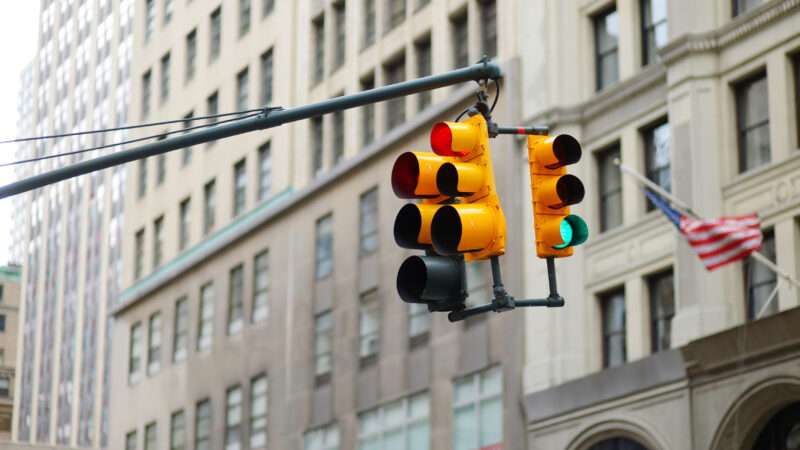
When the New York Legislature first approved a plan to toll drivers entering congested lower Manhattan in 2019, interest groups scrambled to get their own special exemptions to the forthcoming tolls.
Now, with all the exemptions handed out, the toll schedules set, and final implementation just around the corner, everyone who didn't get their requested carve-out is suing to halt the whole congestion pricing scheme.
On Thursday, the United Federation of Teachers (UFT), which represents teachers in New York City's public school system, along with Staten Island Borough President Vito Fossella and individual teachers filed a federal lawsuit accusing federal and New York transportation officials of failing to conduct an adequate environmental review of its congestion pricing program. Their lawsuit was filed in the U.S. District Court for the Eastern District of New York.
"Federal, state and city transportation authorities conducted a rushed and hurried approval process for the congestion pricing plan," said the union on X (formerly Twitter). "The current plan would not eliminate air and noise pollution or traffic, but would simply shift that pollution and traffic to the surrounding areas."
The teachers' lawsuit follows New Jersey's earlier environmental lawsuit challenging congestion pricing filed last summer. Both argue that federal highway officials greenlit New York's tolling program without conducting a thorough enough environmental analysis, as required by the National Environmental Policy Act (NEPA).
NEPA requires that federal officials study the environmental effects of decisions they make—whether those are big decisions (like funding a new highway) or small ones (like approving a new vape device).
In New York's case, federal sign-off of congestion pricing was required before the state could impose tolls on federally funded highways entering Manhattan.
Because NEPA allows third parties to sue over allegedly inadequate environmental studies, it's become a favorite tool of environmentalists, slow growth activists, and garden variety NIMBY (not in my backyard) trying to stop or delay infrastructure projects.
To head off these legal challenges, federal agencies and their state partners will produce voluminous "litigation-proof" documents that attempt to leave no impact unexamined.
The final environmental assessment and related appendices produced by the Metropolitan Transportation Authority (MTA)—the New York state agency that would run New York City's congestion pricing scheme—is close to 5,000 pages long. The agency also collected another 28,000 pages of public comments during the years-long study and consultation process.
According to the teachers' union lawsuit, this all fails to adequately capture the impacts of congestion pricing.
Their lawsuit takes particular issue with the fact that the actual congestion toll schedule—which would be $15 for most drivers and $36 for larger vehicles—wasn't finalized until after the MTA's environmental assessment was completed.
Those final toll levels will be "most consequential" in changing "driver behavior and the resultant environmental impact," reads the lawsuit. Any study that purports to examine congestion pricing's environmental impact without those final tolls is therefore inadequate.
The federally blessed MTA Environmental Assessment did look at several different base tolling schedules, ranging from $9 to $23. It found that all proposed toll rates would reduce congestion on net, but could increase congestion in some local areas as drivers change their routes to avoid tolls.
The teacher's union lawsuit also attacks the MTA's "blind drive" to acquire more money for the public transit services it operates.
Putting aside the irony of a teacher's union accusing someone else of a self-interested cash grab, there is some merit to this particular complaint.
Congestion pricing has been used successfully in London, Singapore, and other international cities to reduce traffic and improve trip times. That benefits drivers with places to be, who can now pay a toll to avoid being struck in traffic. The revenue generated by congestion tolls is the icing on the cake.
But in New York, congestion pricing has been primarily pitched as a way of raising money for the terminally in-the-red MTA. That's arguably cost the policy some support from motorists who don't ride transit but will benefit from less congested roadways.
Politicians and union officials have since responded to motorists' anger by filing NEPA lawsuits to bring congestion pricing down.
The UFT lawsuit asks the federal district court to halt the implementation of congestion pricing, throw out the Environmental Assessment that's been performed on the program, and require an even more rigorous Environmental Impact Statement.
The post Teacher's Union Sues to Stop New York Congestion Pricing Plan appeared first on Reason.com.







